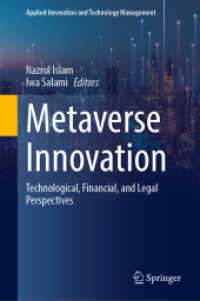- ホーム
- > 洋書
- > 英文書
- > Politics / International Relations
Full Description
Since the late 1980s, there has been a global upsurge of various forms of regionalist projects. The widening and deepening of the European Union (EU) is the most prominent example, but there has also been a revitalization or expansion of many other regionalist projects as well, such as the African Union (AU), the Association of Southeast Asian Nations (ASEAN), the North American Free Trade Agreement (NAFTA) and the Southern Common Market (Mercosur). More or less every government in the world is engaged in regionalism, which also involves a rich variety of business and civil society actors, resulting in a multitude of regional processes in most fields of contemporary politics. In this new text, Fredrik Söderbaum draws on decades of scholarship to provide a major reassessment of regionalism and to address questions about its origins, logic and consequences.
By examining regionalism from historical, spatial, comparative and global perspectives, Rethinking Regionalism transcends the deep intellectual and disciplinary rivalries that have limited our knowledge about the subject. This broad-ranging approach enables new and challenging answers to emerge as to why and how regionalism evolves and consolidates, how it can be compared, and what its ongoing significance is for a host of issues within global politics, from security and trade to development and the environment. Retaining a balanced and authoritative style throughout, this text will be welcomed for its uniquely comprehensive examination of regionalism in the contemporary global age.
Contents
1. Introduction
2. Learning from History
3. Learning from Theory
4. The Richness of Comparative Regionalism
5. Obviating the Gap Between Formal and Informal Regionalism
6. Organizing Regional Space
7. Multidimensional Regionalism
8. Civil Society in Regionalism
9. External Actors in Regionalism
10. Regionness: The Solidification of Regions
11. Regions in Interregionalism
12. Regions in Global Governance
13. Conclusion.







